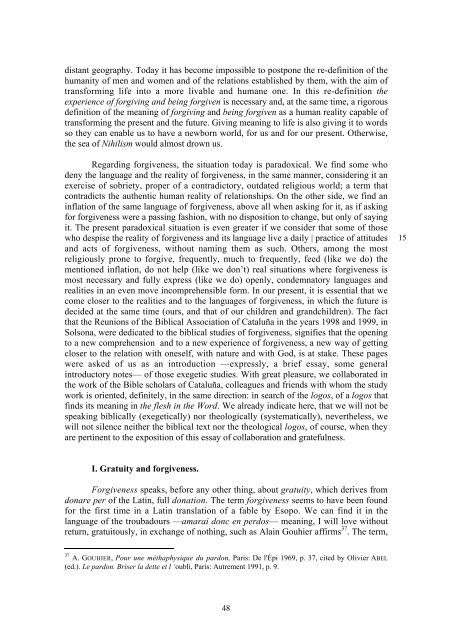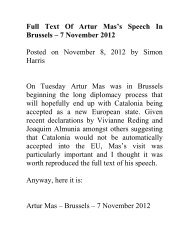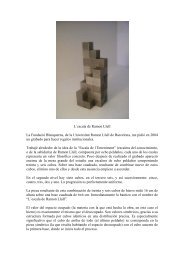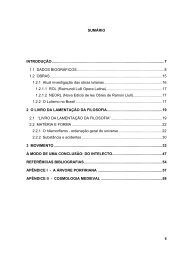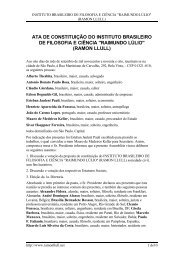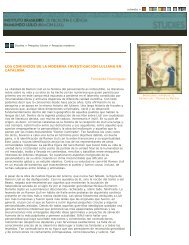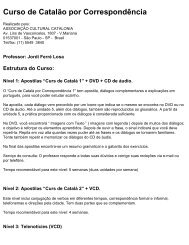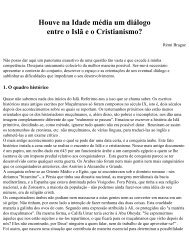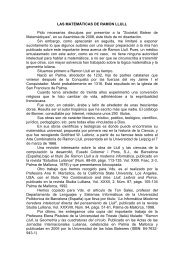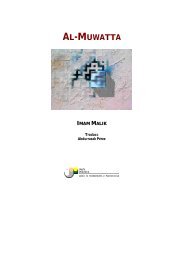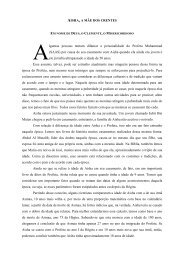You also want an ePaper? Increase the reach of your titles
YUMPU automatically turns print PDFs into web optimized ePapers that Google loves.
distant geography. Today it has become impossible to postpone the re-definition of the<br />
humanity of men and women and of the relations established by them, with the aim of<br />
transforming life into a more livable and humane one. In this re-definition the<br />
experience of forgiving and being forgiven is necessary and, at the same time, a rigorous<br />
definition of the meaning of forgiving and being forgiven as a human reality capable of<br />
transforming the present and the future. Giving meaning to life is also giving it to words<br />
so they can enable us to have a newborn world, for us and for our present. Otherwise,<br />
the sea of Nihilism would almost drown us.<br />
Regarding forgiveness, the situation today is paradoxical. We find some who<br />
deny the language and the reality of forgiveness, in the same manner, considering it an<br />
exercise of sobriety, proper of a contradictory, outdated religious world; a term that<br />
contradicts the authentic human reality of relationships. On the other side, we find an<br />
inflation of the same language of forgiveness, above all when asking for it, as if asking<br />
for forgiveness were a passing fashion, with no disposition to change, but only of saying<br />
it. The present paradoxical situation is even greater if we consider that some of those<br />
who despise the reality of forgiveness and its language live a daily | practice of attitudes<br />
and acts of forgiveness, without naming them as such. Others, among the most<br />
religiously prone to forgive, frequently, much to frequently, feed (like we do) the<br />
mentioned inflation, do not help (like we don’t) real situations where forgiveness is<br />
most necessary and fully express (like we do) openly, condemnatory languages and<br />
realities in an even move incomprehensible form. In our present, it is essential that we<br />
come closer to the realities and to the languages of forgiveness, in which the future is<br />
decided at the same time (ours, and that of our children and grandchildren). The fact<br />
that the Reunions of the Biblical Association of Cataluña in the years 1998 and 1999, in<br />
Solsona, were dedicated to the biblical studies of forgiveness, signifies that the opening<br />
to a new comprehension and to a new experience of forgiveness, a new way of getting<br />
closer to the relation with oneself, with nature and with God, is at stake. These pages<br />
were asked of us as an introduction —expressly, a brief essay, some general<br />
introductory notes— of those exegetic studies. With great pleasure, we collaborated in<br />
the work of the Bible scholars of Cataluña, colleagues and friends with whom the study<br />
work is oriented, definitely, in the same direction: in search of the logos, of a logos that<br />
finds its meaning in the flesh in the Word. We already indicate here, that we will not be<br />
speaking biblically (exegetically) nor theologically (systematically), nevertheless, we<br />
will not silence neither the biblical text nor the theological logos, of course, when they<br />
are pertinent to the exposition of this essay of collaboration and gratefulness.<br />
I. Gratuity and forgiveness.<br />
Forgiveness speaks, before any other thing, about gratuity, which derives from<br />
donare per of the Latin, full donation. The term forgiveness seems to have been found<br />
for the first time in a Latin translation of a fable by Esopo. We can find it in the<br />
language of the troubadours —amarai donc en perdos— meaning, I will love without<br />
return, gratuitously, in exchange of nothing, such as Alain Gouhier affirms 37 . The term,<br />
37 A. GOUHIER, Pour une méthaphysique du pardon, Paris: De l'Épi 1969, p. 37, cited by Olivier ABEL<br />
(ed.). Le pardon. Briser la dette et l ‘oubli, Paris: Autrement 1991, p. 9.<br />
48<br />
15


